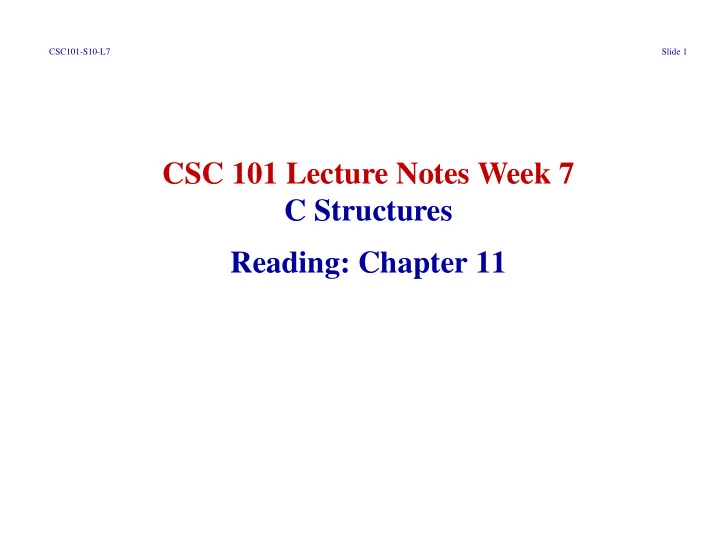

CSC101-S10-L7 Slide 1 CSC 101 Lecture Notes Week 7 C Structures Reading: Chapter 11
CSC101-S10-L7 Slide 2 I. Intro to C Structures A. An array has multiple elements of the same type . B. A structure has multiple elements of different types .
CSC101-S10-L7 Slide 3 C Structures, cont’d C. Consider first example in Ch 11 of the book. 1. It’s a structure for planet, with components: • name • diameter • number of moons • orbit time • rotation time
CSC101-S10-L7 Slide 4 C Structures, cont’d D. The example code is here: 101/examples/structs/jupiter.c
CSC101-S10-L7 Slide 5 II. Arrays of Structures A. A struct type can be the same as any other C type, such as int or double or char * . B. Hence, arrays of struct types are just fine. C. For example:
CSC101-S10-L7 Slide 6 Arrays of Structures, cont’d #define MAX_PLANETS 100 typedef struct { double diameter; Planet planets[MAX_PLANETS]; char galaxy[STRSIZ]; } SolarSystem;
CSC101-S10-L7 Slide 7 Defining Types in Header Files A. The upgrade from jupiter.c to our-solar-system.c was awkward. B. Both programs use type Planet . C. Entire def had to be copied into both files. e programs share definitions. D. We’d like to hav
CSC101-S10-L7 Slide 8 Defining Types in Header Files, cont’d E. Solution -- use .h files. 1. They allow definition sharing. 2. Also support clean design of larger programs.
CSC101-S10-L7 Slide 9 Defining Types in Header Files, cont’d F. Design of Planetary Program: • planet.h • planet.c • planet-test.c • solar-system.h • solar-system.c • solar-system-test.c
CSC101-S10-L7 Slide 10
Recommend
More recommend